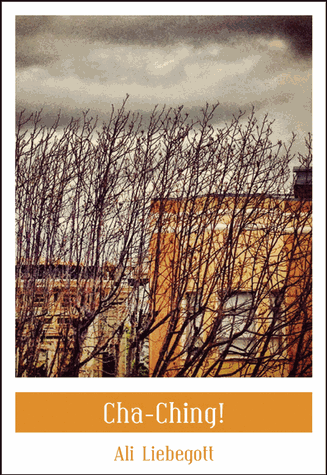 Cha-Ching, by Ali Liebegott, City Lights Publishers, 252 pages, $15.95 paperback, April, 2013 release.
Cha-Ching, by Ali Liebegott, City Lights Publishers, 252 pages, $15.95 paperback, April, 2013 release.
Theo, the lesbian protagonist of Lambda award-winning writer Ali Liebegott’s third novel, has been down on her luck for quite some time. Nonetheless, she has a plan. Since she’s on the cusp of turning thirty, she’s decided to give up her seedy San Francisco apartment and head to New York City. There, she fantasizes, all of the things that have bogged her down—poverty, loneliness, self-doubt and multiple addictions, among them—will fall by the wayside and a new, improved Theo will miraculously emerge.
“In New York Theo would be a person who didn’t drink or smoke or watch TV,†Liebegott writes. “She’d transform herself into a well-read adult, starting with the complete works of Fyodor Dostoyevsky, then move her way through the biographies of famous painters. She’d always wanted to take a painting class and find out if she was secretly a brilliant artist. In New York, she’d get a gym membership—she could read Crime and Punishment on the stationary bicycle.â€
Of course, in her heart of hearts, Theo knows that this isn’t how life works.
In fact, even before she gets into her car for the Big Move, fate shoots her a whammy and out of nowhere she finds herself in the company of a seriously injured pit bull who forces her to make a choice: Can she walk away, leaving the pooch to die on the sidewalk, or does she have to at least try to rescue him?
Several hundred dollars in veterinarian bills later, Theo and her canine companion–she whimsically names him Cary Grant–are finally ready to hit the road. Suffice it to say, it’s a long, strange trip east and by the time Theo reaches Yonkers, she’s done with traveling. She quickly finds a room in a ramshackle apartment and then obtains low-wage work as a clerk in a local convenience store. Charmed it’s not.
“Yonkers was a fucking time warp,†Liebegott writes. “When she left San Francisco Theo thought she didn’t care if she ever saw a gay pride flag again. But the gay people in Yonkers seemed to lack not just gay pride but gay ambition.â€
Still, she stays put, squirreling away money and gaining a toehold on economic solvency. A few months later, however, Theo calls the one person she knows in the City, a butch female bartender named Sammy. The next thing you know, the two have decided to share an apartment in Brooklyn and their struggle to find romance, friendship and camaraderie takes center stage.
Liebegott has captured the grit of mid-1990s Brooklyn extremely well. And, by making the neighborhoods of Sunset Park, Bensonhurst and Coney Island part of the novel’s backdrop, the story is given added heft. But this is no fairy tale, and as Theo moves from one dead-end job to another there are multiple slips into bad behavior—Atlantic City seems to tug at her and she loses more money than she can afford to squander. Nonetheless, her escapades and burgeoning love affair with a lovely young woman named Marisol make the promise of redemption seem not only tangible, but likely. Furthermore, while Theo’s dreams of intellectual or artistic ascent may be far-fetched, one closes Cha-Ching knowing that Theo, Sammy, and Marisol are going to be alright. Indeed, despite slamming into economic want, substance and gambling abuse, substandard housing, and the hard wall of homophobia, theirs is an ironclad sisterhood.
Cha-Ching is a moving coming-of-age tale, funny and heartbreaking, compassionate and real. While I wanted a bit more background on Theo’s upbringing and early life, this is a small criticism in an otherwise well-paced, well-written, and well-conceived story.

Leave a Reply